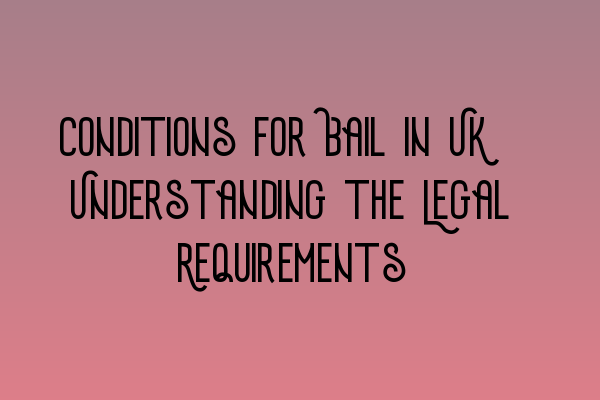When it comes to criminal law in the UK, understanding the legal requirements for bail is essential. Bail is a crucial aspect of the criminal justice system, allowing individuals to be released from custody while awaiting trial, under certain conditions. In this blog post, we will delve into the conditions for bail in the UK and provide you with a comprehensive understanding of the legal requirements.
A Brief Overview of Bail
Bail is a legal concept that allows an individual who has been arrested or charged with a crime to be released from custody until their trial. The purpose of bail is to strike a balance between two key factors – the presumption of innocence until proven guilty, and the need to ensure public safety and prevent flight risks.
Before diving into the conditions for bail, it’s important to note that the granting of bail is not an automatic right. The decision is made by the court, taking into consideration various factors such as the seriousness of the offense, the individual’s criminal history, the likelihood of the individual attending court, and any potential risks to the public.
Conditions for Bail
When granting bail, the court imposes certain conditions that the individual must comply with. These conditions may vary depending on the specific circumstances of the case, but typically include:
- Residence requirement: The individual may be required to provide a verifiable residential address and stay at that address unless specified otherwise by the court.
- Reporting requirement: The individual may be required to report to a local police station on a regular basis, as directed by the court.
- Restrictions on travel: The court may impose restrictions on the individual’s travel, requiring them to surrender their passport or travel documents and seek permission if they need to travel outside a specified area.
- Curfew: The court may impose a curfew, requiring the individual to remain at a specific location during designated hours.
- Electronic monitoring: In some cases, the court may order the individual to wear an electronic tag or ankle bracelet to monitor their movements.
It’s important to note that these conditions are not exhaustive, and the court has the discretion to impose additional or alternative conditions based on the specific circumstances of each case.
The Role of a Solicitor in Bail Applications
When it comes to bail applications, having a knowledgeable and experienced solicitor by your side is crucial. A solicitor can assist you in presenting a strong case for bail and help you navigate the complex legal requirements.
If you find yourself in need of legal representation in the UK, whether it’s for criminal law matters or guidance on Delaware LLCs, you can rely on the expertise of SQE Criminal Law & Practice Law UK. Their team of experienced solicitors can provide you with expert advice and represent your interests effectively.
Conclusion
Bail is an important aspect of the criminal justice system in the UK. Understanding the legal requirements and conditions for bail is crucial for both individuals facing criminal charges and legal professionals. By ensuring compliance with the conditions set by the court, individuals can secure their freedom while awaiting trial and seek the guidance of a solicitor to navigate the complexities of the legal process.
For more information on legal challenges for UK businesses or SQE exam preparation, make sure to check out these related articles:
